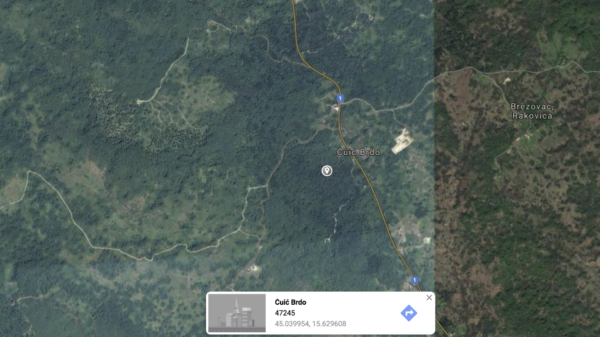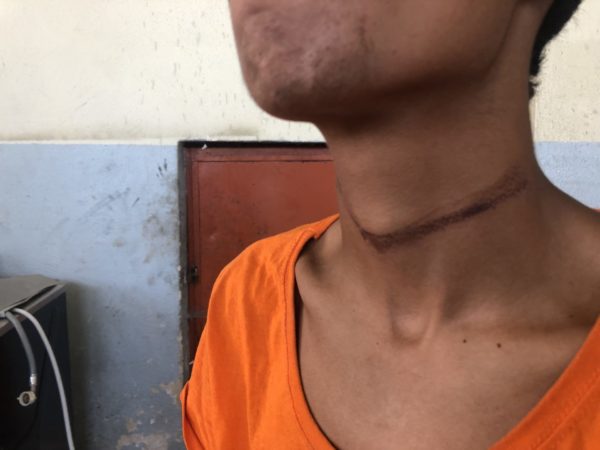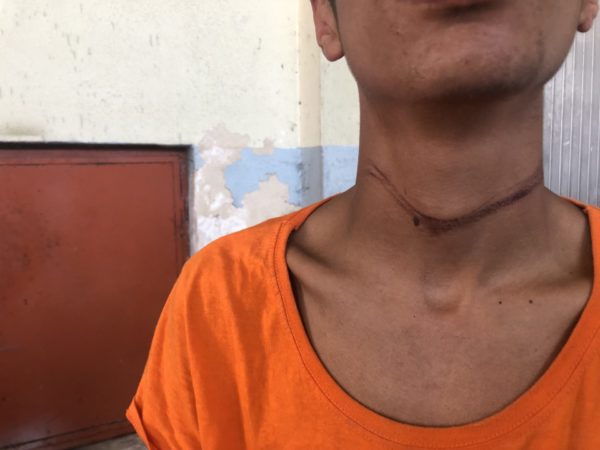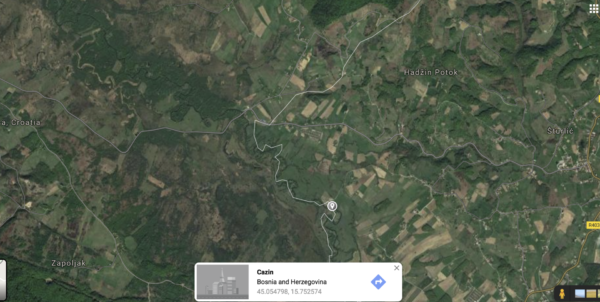The respondent described leaving with a group of six other Algerian men from Velika Kladuša on the 1st of August, after which he walked down to the border town of Šturlić and rested for a day. The respondent, who is 18 years old, was the youngest member of the group. In the early morning hours of the 3rd of August, the respondent and his friends crossed into Croatia.
“I went to Šturlić, walking 23 kilometers in one day. We stayed there for one day to rest and the next day we went on [into Croatia].”
The respondent stressed his belief that it was important to attempt to cross the border during the first hours of the morning, inferring that police apprehension along the border at night are more violent and back by more surveillance technology:
Yes, because during night there are drones. You see them, I think there is ten. They see you. You cannot cross the border during night because when the police catches you in the night, they beat you a lot. They break you. There is different police during the night and during the day. The police during the night is dresses [in black uniforms and masks] like this. The policeman who [later] beat me was wearing a mask. That way you cannot remember him.
Once in Croatia, the group continued walking for two days in the interior until an forested area near the village of Ćuić Brdo (HR) [45.039954, 15.629608].
The second day we heard voices but we didn’t know if they are policemen or other people. We had to cross the big road, that leads to Zagreb. 200 meters before that road, two friends went to see, if the road is free to cross. They came back with a policeman, who pointed a gun to their heads. Just one old policeman, I think he was 50 years old. He told us to stay here and called another one, who came after 5 minutes.
Thus, the group was apprehended, initially, by a single, middle-aged Croatian police officer at around noon on August 5th. He was soon joined by another officer who waited with the group.
When they were apprehended, the respondent described that entire group was apprehended. None of them attempted to run away or escape, despite there only being a single Croatian police officer who initially apprehended them. The respondent described that this was mainly due to their group not having multiple mobile phones.
“When you are in Croatia and you walk one day or two days…you don’t run. Because when you run the group’s gonna spread: Three go there and two go there. Some people don’t have a phone. When you are in Croatia and you don’t have a phone and you don’t have a powerbank, you’re done. You cannot walk because you must have GPS. Me, I don’t have a phone any more because I was in Croatia and they broke my phone two times already. This time I didn’t have a phone. We could run from that policeman because he was alone, just one policeman and seven people. We could run easily. But I don’t have a phone and I asked my friends: ”What shall we do? Shall we run or shall we stay?” They told me: “Let’s stay.” So we stayed.”
Several phones were also taken from the group before their push-back. The respondent described that, before they were confiscated, the group-members were made to unlock their phones, ostensibly so the officers could access the route in which they were attempting to walk through.

“He didn’t talk to us at all. When the third policemen came, the one who punched me on my face, he asked us: “Do you have a friend, who escaped?” We said: “No.” Then he slapped one of us in the face. For nothing, just like that.
“After one more hour, a third policeman came; the driver of the car, that took us to the border. Until that point there hasn’t been a fight. But after they took us to the border, they opened the door and we could see them getting ready for beating.”
“They told us to come and took us to the car, a big car. One by one entered. While driving the car, he suddenly stopped and we all fell on the floor.”
Furthermore, the respondent described their being a lack of oxygen in the vehicle and finding it difficult to breathe during their containment inside.
“We couldn’t breathe inside because there was no oxygen. The air condition wasn’t working or he didn’t switch it on. So we couldn’t breathe.”
The respondent also recalled that on their way back to the border, the vehicle stopped and three Afghan women entered the van who were later pushed back with them.
“On the way to Bosnia they also caught three people. Two girls, 18 or 19 years old I think, and their mother. I guess she was around 50 – 55 years old. She couldn’t breathe.”
“They were caught in a different area, next to a village. They were about to take a bus to Zagreb. They wanted to ask for asyl in Zagreb. They bought a bus ticket in that village. Everybody in Croatia calls the police when they see you. So they caught them and took them with us to the border. The old woman couldn’t breathe. She thought she was dying because she was old and she couldn’t breathe.”
Once they finally arrived back at the border, it was around 3:00 in the afternoon. The respondent described that there were somewhere between eight or nine police officers at the border who participated in their push-back process. At this location, the Korana river marked the border between Bosnian and Croatia. The water of the river rose to the respondent’s thigh. The respondent described that of the eight or nine police officers present at the push-back location, however only one officer wore a black balaclava mask over his face. The respondent inferred that the officer wore this mask to protect his identity.
[He wore this] because he is beating immigrants. If immigrants remembered him, they would kill him. So if he is dressing like that, you cannot remember him.
It is of note that the officer that kicked and strangled the respondent did not wear a mask. This officer was the third to arrive on the scene of the group’s apprehension and was described as driving the group back to the Bosnian-Croatian border. It is of interest that the respondent recalled that the officer changed his clothes between their initial apprehension and push-back
“He changed his clothes. First, when we were caught, he wore blue clothes. Later he came with black police clothes.”
It should be noted that the respondent described the Croatian police officers during this procedure as being unusually violent. He inferred that this was, perhaps, due to him being that last group-member to cross over the border.
“They beat us one by one and then they told us to go to Bosnia. There was a river to cross to enter Bosnia. So each of us crossed the river after being beaten up. Some people got beaten up hard, some people got beaten up less. Me, the last one, they beat a lot. The first and the last ones get beaten up the most. One grabbed my shirt and another one punched me. Like that I couldn’t protect my face. When the policeman got tired from beating, the second one grabbed the back of my shirt. I told them: “Stop! You’re hurting me. I cannot breathe.” He grabbed me like that and kicked my face two times with his leg.”


The respondent described that during this violent interaction with the Croatian police officers, he took a moment of inaction to escape and run away, back into BiH.
“He forced me on the ground and then kicked me. When he saw that I was about to loose consciousness, he left me and within 5 seconds I ran. He was about to beat me more but I ran. Because when you enter Bosnia, he won’t follow. So we went, I was bleeding for 5 hours.”
“[I bled] from my nose. Now my nose is broken, here and here.”
In particular, the officer in the mask and the “third officer” who transported the group back to the border were described as engaging in physical violence with the respondent.
“[The masked officer] didn’t beat me so bad. He didn’t punch me in the face. He beat me just on the arms and legs. But the [“Third officer”] who kicked me on the face, hurt me so much. It felt like, when he beat me, my nose just cracked, it broke. And then I was bleeding for five hours. It was too much blood.”

“They didn’t beat women. They beat just us.”
After the entire group crossed back over the border, they walked back to Šturlić (BiH) where they attempted to take a public bus back to Velika Kladuša however they were refused by the bus driver. Accordingly, they rested for the rest of the night and walked the 20 km distance back to Velika Kladuša the following day.
